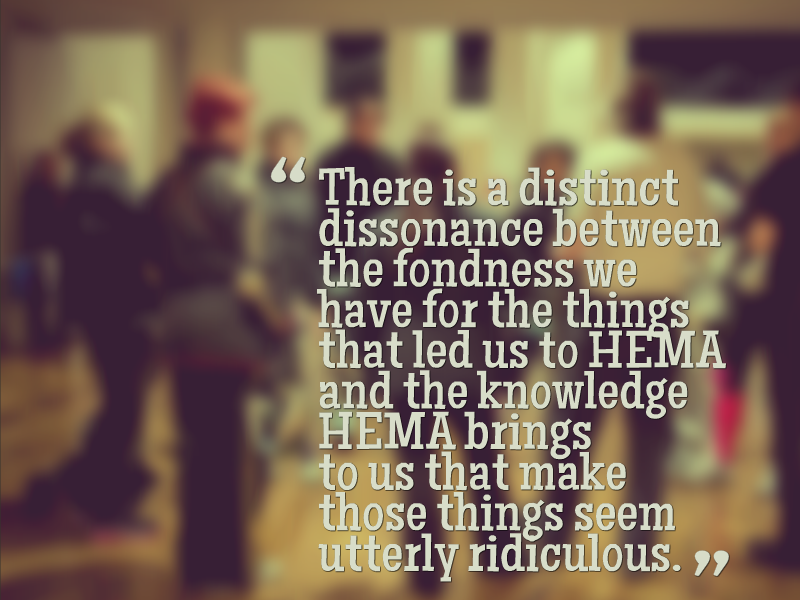Original Post: 10 Apr 2014
The views contained in this article are those of the author.
By Kristen Argyle
“Why don’t more women/girls do X?”
I’m not a stranger to participating in activities that are perceived to be male-dominated. HEMA is just about the third or fourth one I’ve taken up in my lifetime, and was certainly not the last. I’d like to say that being a girl has never interfered with my enjoyment of these activities or caused any degree of cognitive dissonance, but that hasn’t been true since that odd day that girls tend to have where we suddenly realize that not only are we girls, but that being a girl means something. Put bluntly, whether a slow realization or a sudden shock from reality, at one point girls have to somehow reconcile that they are different; In a lot of ways, that will probably mean it suddenly dawns on us that we aren’t considered the default for human. Not necessarily non-human, for sure, but this sort of after-thought of, “Oh yeah, some people are female.”
Simplistically, a lot of people imagine this moment as one or two crystallizing moments: a parent sadly revealing to his/her daughter the facts of life and culture and as gently as possible trying to lower her expectations and prepare her for harsh reality, or a girl brushing up against that harsh reality in the form of a unkind nay-sayer telling her exactly what being a girl means and it’s a bleak, limiting existence where only the kindness and protection of others or utter ruthlessness and deceit will save you. Both of those things happen to women for sure, but it’s not as cut-and-dry, nor is it something that happens once and then you’re set for life. If I may try to characterize my experience, it can feel a bit like a daily struggle against a never-ending tide of facepalm. And nowhere else is this tide greatest than that inescapable monolith: the media.
I don’t have to tell HEMA-ists that sometimes the popular portrayal of something is completely, utterly, and even dangerously wrong, wrong, wrong. As much as we can attribute our interest in sword fighting to various media, we still take a mixture of glee, heavy sighs, and outright gnashing of teeth in pointing out misconceptions of weaponry, weapon use, armor, history, culture, and anything else that falls under the wide purview of any combination of “Historical,” “European,” “Martial,” or “Arts.” I love Dungeons and Dragons, but I still get an eye-twitch when I read a two-handed sword as being 20 lbs (9kg). There is a distinct dissonance between the fondness we have for the things that led us to HEMA and the knowledge HEMA brings to us that make those things seem utterly ridiculous.

If that sort of dissonance makes sense to you — whatever reconciliation you personally have decided on — then with that in mind recall how women are portrayed when they are engaging in some decidedly non-feminine pursuit. I will humbly identify two archetypes that I sincerely believe you will see whether it’s video games, martial arts, construction, chess, or whatever — the Virgin and the Dominatrix.
(And yes, those two terms are deeply tied in to sexuality and yes, part of the point is that women tend to be defined by the view of them from outside, in relation to others and not in themselves and for some reason sex is involved. That’s another article. However, please note that I’m not passing judgment on either of these archetypes as “good” or “bad” at the moment. Perhaps just “limited.”)
The Virgin: cute, innocent, clumsy, kind, inexperienced, unskilled. The Virgin’s purpose is to be non-threatening and unintimidating. This isn’t a bad thing — after all we all come into the world that way.
The Dominatrix: hard, determined, cold, experienced, skilled. The Dominatrix is the ultimate bad girl that does all the things we want to. This, as well, isn’t necessarily bad — people want to be powerful and in charge.
Here’s the key with these two archetypes: there is little to no room in between. They are supposed to be polar opposites. Yes, you can be a Dominatrix with a soft, squishy heart or a Virgin with a tendency to explode, but you tend to fall roughly into one or the other based on how “badass” you are. If you are immensely skilled and talented, you are pegged as a Dominatrix that likes to win. If you are hilariously unskilled and clumsy, you are pegged as a Virgin that just wants everyone to have fun and get along.
The Virgin, quite simply, is not supposed to beat you. The Dominatrix is. Therefore, you don’t have to worry about beating or getting beaten by a female because everything is as it should be.
This tends to be what women and girls have to go on when they approach something perceived as male-dominated or male-oriented. These are the two images that stick in our heads as “the way women are when they do these things that aren’t for women,” no matter how much we might know better. What if you don’t know any better? Then suddenly two-handed swords just are 20 lbs and people in the Medieval era just bashed at each other with them because all combat was truly a competition of strength and constitution while skill and technique wouldn’t be invented in the West until the rapier was introduced. And other quite incorrect things I will not enumerate here. The point is that we tend to go with what imagery we’ve seen and makes sense to us at the time as our point of reference until we have something better.
What I think this does to women in HEMA, and indeed other things as well, is cut out the lifeblood of doing or learning anything — the middle part.
We may start any new activity as relative Virgins where it’s safe to be a little clumsy and nervous and unreasonably perky. It’s okay to get beaten by pretty much everyone and it’s okay when you win by a fluke or because someone was going easy. They’re happy, you’re happy, everything is good. I believe that many well-intentioned women start HEMA this way.
But then they have to wonder what the end goal is. And then that Dominatrix in our heads shows up. Ah ha! At the end of all this training and hard work and learning is that woman! And she’ll be me!
Then we find ourselves thinking we can’t possibly be that woman because we’re not good enough, strong enough, dedicated enough, or whatever, or maybe we just don’t want to be that way or don’t care all that much about beating and winning. At that point, why keep going? We’re learning, but it’s always with a caveat. The caveat being, “I will never be that woman.” What’s the purpose of all the work if you’re always going to just be the under-competent klutz because you can’t be the over-competent badass?
This is where I think that otherwise committed individuals quit. Not just women either. They’ve gone for awhile, gotten to a degree of competency, spent a not-insignificant chunk of money, and then suddenly, poof. Gone. What happened? It’s possible they got to a point where they feel comfortable leaving because they have a level of proficiency they’re proud of and don’t feel like they need anymore. Not everyone who leaves is a victim of something. But perhaps some of those who leave do so because they don’t know what the middle looks like.
We know what starting looks like. We know what the pinnacle looks like. What’s in between? We’re probably aware the montage is a great story-telling device, but a terrible reflection of life. After all, the montage takes maybe 5% of a movie’s time and represents a few weeks or months of work, while for the rest of us it can be a lifetime dedication to achieve such levels of skill. Despite knowing better, the “Montage Model” still remains perniciously hard to get rid of. It robs people of the ability to recognize progress, because it doesn’t happen as starkly. It encourages them to make radical changes we can’t possibly maintain all at once, because it’ll only be for a little while and the results will last forever. Finally, it maligns training, sweat, and hard work as means to merely one end, instead of the myriad of rewards we know they are and perhaps even worthy ends themselves.
The middle is where most people will spend most of their time. The Virgin and the Dominatrix are just convenient constructs representing slivers on either end of a spectrum that is mostly “middle” and probably not even one-dimensional. You probably don’t want to be, or frankly can be, either of them when it comes right down to it.
It’s easier to be mediocre or average when you have an idea of what that looks like. We’re familiar with heroes struggling against forces greater than they and breezing through lesser challenges. Heroes are accorded more “middle,” even if they conveniently skip the area between total incompetence and better-than-average. What the Virgin/Dominatrix dichotomy tends to do is limit that middle ground even more for women. It’s more absolute. Being average or better-than-average isn’t good enough for a heroine.

Without these kinds of reference points, it becomes hard to imagine oneself as a developing fighter with some degree of competence and for that to be okay.
Without that visualization, it’s easy to feel like it’s just “not your thing” and give up because you’re not getting better. The truth is, you are getting better. All the time. In ways you might not even be aware of.
And y’know what? It wouldn’t matter if you weren’t anyway. Most of us will never have to defend our lives with Ancient, Medieval, Renaissance, or Early Modern weapons, and that’s a good thing. We study because we want to. Because there’s something about the sword that draws us in. It’s in the process — the time between the Virgin and the Dominatrix, the montage, the work and sweat, the opportunity to learn the ways of the sword — that the true satisfaction lies. And that is where you must look for your inspiration.
About the Author — Kristen Argyle studies and sometimes even teaches HEMA at True Edge Academy and is pursuing Computer Engineering at University of Utah in Salt Lake City, Utah, USA. She spent her childhood searching for toy weapons that wouldn’t break and running around the foothills playing pretend. Strangely enough, it turned out to be a plastic Xena: Warrior Princess sword. She’s since realized she can’t really explain what draws her so inexorably to weapons, but is concerned that people know she holds no fascination with hurting people. The penchant for analytic writing comes from a degree in Philosophy she also has and declines to discuss in detail. She doesn’t always play Dungeons and Dragons, but when she does she especially enjoys Fighters.
